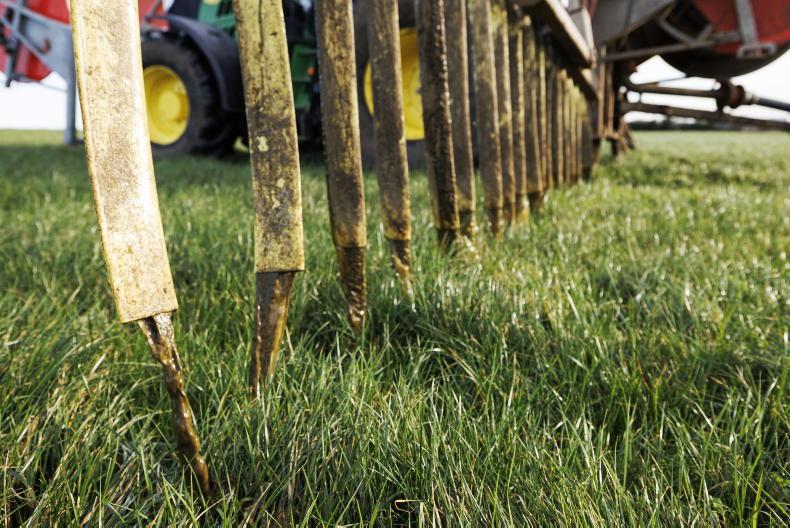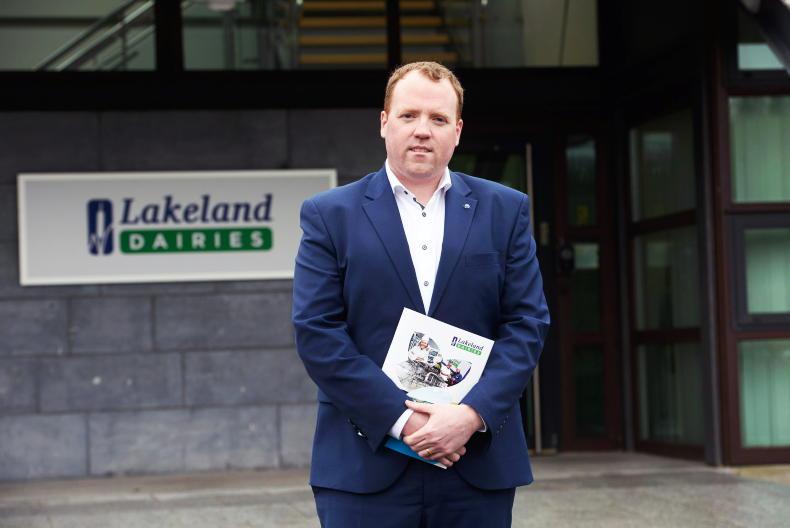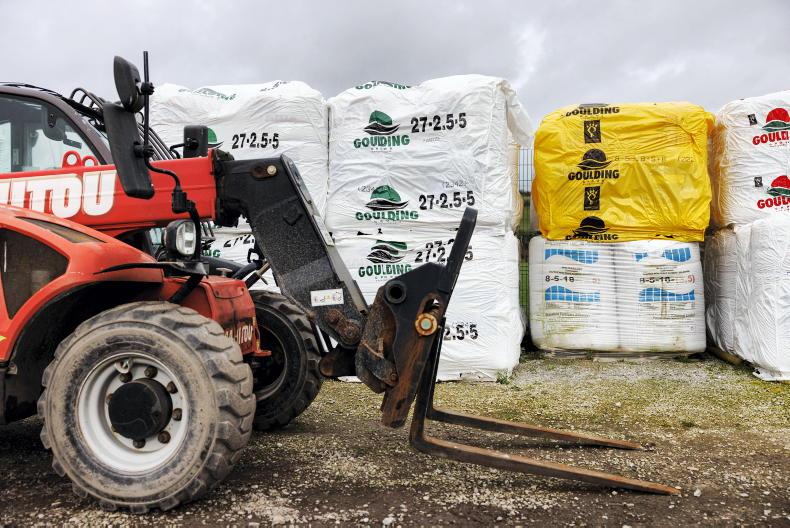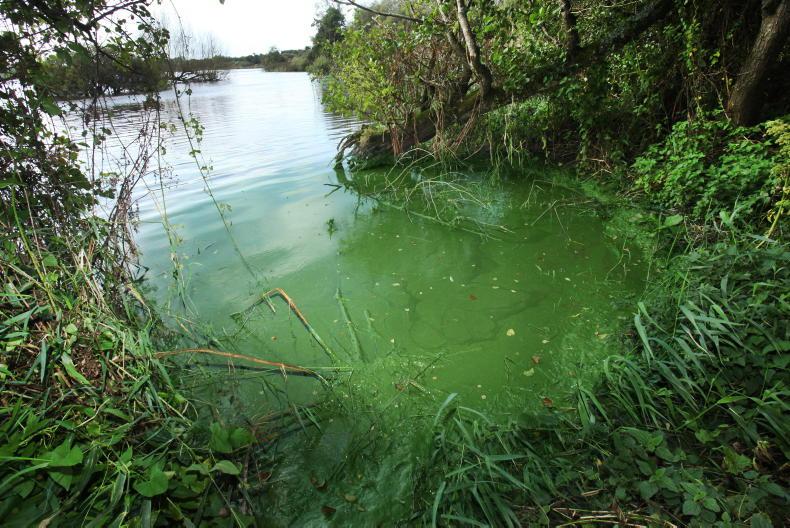Ammonia strategy – Back in January, DAERA published its draft ammonia strategy, which includes a proposal to ban splash-plate slurry spreading from 2026 onwards. The proposal was later deemed “totally unacceptable” by the Ulster Farmers’ Union.
DAERA's ammonia strategy proposes banning splash plate slurry spreading from 2026 onwards. \ Donal O' Leary
Bluetongue – The viral disease was detected in several European countries throughout 2023. In November, the first outbreak in Britain since 2007 occurred. By mid-December, there were 11 cases on six different premises in England.Chief executives – New head honchos were appointed to various companies and organisations within NI agri-food this year. This includes Colin Kelly at Lakeland Dairies, Conall Donnelly at Countryside Services, Ian Stevenson at the NI Dairy Council, Daryl McLaughlin at the NI Meat Exporters’ Association, John Moore at Sustainable Ruminant Genetics, Kevin Doherty at Rural Support and Gillian McKeown at the Young Farmers’ Clubs of Ulster.
Colin Kelly took up the role of Group CEO at Lakeland Dairies.
Dairy stats – The latest statistics from DAERA show the average milk price paid to NI dairy farmers over the first 10 months of the year stood at 34.71p/l, down from 44.54p/l during 2022. Total milk production to the end of October was down slightly at 2.13bn litres.EFS – Agreements for the sixth and final tranche of the Environmental Farming Scheme wider level started this year. A seventh tranche of EFS higher level opened for applications in May 2023 for agreements to start in January 2024.Fertiliser use – Despite prices easing back throughout most of 2023, the amount of fertiliser bought by NI farmers hit another record low. Over the first three-quarters of the year, there were 202,400t of fertiliser delivered to local farms, which is down 13% year-on-year and is 29% lower than the same period in 2021.
The amount of fertiliser bought by NI farmers hit another record low this year. / Donal O' Leary
Genetics body – A long-awaited livestock genetics body for NI was finally launched in June 2023. Sustainable Ruminant Genetics aims to help farmers improve livestock genetics by basing breeding decisions on a range of data.Headage payment – A new headage payment for beef cattle has been finalised and comes into effect from January 2024. Although introduced incrementally, by April a £75/head payment under the Beef Carbon Reduction Scheme will be available for all NI-born prime cattle that meet slaughter age criteria.Industry group – A group of various bodies from the NI sheep sector put forward proposals in February for new support measures worth up to £15/ewe. DAERA said the proposed plan will be considered in due course, although a sheep headage payment will mean lower payment rates for beef, suckler and protein crop schemes.Judicial review – Plans for a cull of badgers in bovine TB hotspot areas of NI hit a major setback in October when wildlife campaigners won a long-running legal challenge. The High Court in Belfast ruled that the process, which DAERA followed when it set out its proposals for wildlife intervention, was unlawful.Kill figures – The total cattle kill in NI during 2023 is lower than last year’s record high levels. By mid-December, there had been 337,313 cattle slaughtered in NI factories, down 5% on the same period in 2022. By contrast, the lamb kill in local factories was up 5%, to 473,802 head.Land prices – The NI land market continues to reach new heights with record prices seen in every county. Our latest figures published in March 2023 found the average NI land price was up 22% to sit at £13,958/acre.Mobility – After six years of co-ordinating deals between young farmers and retiring landowners, the land mobility scheme in NI closed in August. The Young Farmers’ Clubs of Ulster run scheme, led to 125 separate deals covering 19,000 acres of land.NIPSA – The NI Public Service Alliance entered the farming lexicon this year, when the trade union for civil servants caused huge disruption at local abattoirs. A five-day strike by DAERA vets and meat inspectors in November meant no sheep were slaughtered for a week and there was a tenfold drop in the local cattle kill. Operational protocol – The guidance that DAERA gives local planning authorities about ammonia emissions is under review. Two options were published by the Department in July, and both set out stricter criteria than that recently used to assess planning applications.Phosphorus – The nutrient was a contributing factor to the algal blooms that occurred in Lough Neagh during the summer. The latest DAERA figures published in May 2023 show average phosphorus levels in NI waterways are at 0.073mg/l, which is well up from a low of 0.047mg/l seen back in 2012.
Phosphorus was a contributing factor to the algal blooms that occurred in Lough Neagh. \ Houston Green
Quality assurance – There was a huge backlash from farmers across the UK in October, when Red Tractor tried to introduce a new environmental module to its quality assurance schemes without consulting farmer representatives. It led to the plan going on ice and an independent review into Red Tractor being launched.Rations prices – Prices for livestock rations peaked in the spring, but eased back as grain markets stabilised. Typical beef rations are down £80/t from highs of £350-360/t, with dairy rations dropping by £60/t from peaks of around £420/t.Sustainability bonus – Bonus payments for delivering various sustainability measures will soon be available to the majority of NI dairy farmers. The two largest processors in NI, Lakeland and Dale Farm, are both making a 0.5p/l bonus available next year. Both Tirlán (0.4p/l) and Leprino Foods (0.5p/l) already have sustainability payments in place.TB rates – Bovine TB rates broke records numerous times this year. In January, the incidence rate of 10.43% was the highest since testing began in 1959. It did not stop there and rose further as the months went on. The latest available figures for July show TB incidence rate in NI was at 10.83%.UFU MPI – The milk price indicator (MPI) published by the Ulster Farmers’ Union has been moving upwards for most of the year, as dairy markets have strengthened. It ended the year on 35.04p/l, which points to a base price of around 32p/l in early 2024, after transport and processor margins are considered.Vehicle inspections – The Health and Safety Executive for NI started carrying out a new inspection campaign on NI farms, aimed at farm vehicles. It includes checking that adequate training courses on the safe use of quad bikes and telehandlers have been completed.
HSENI are carrying out a new inspection campaign on NI farms aimed at farm vehicles.
Weather – It has been a turbulent year in terms of weather for NI farms. A dry February was followed by an extremely tough spring. After that, a prolonged dry spell in early summer became a distant memory with the wettest July on record. Sadly, there was no let-up in the rain during the autumn. XL – The term “extra-large” could be used to describe payments to some large scale beef finishers when the new Beef Carbon Reduction Scheme begins next month. Unlike other elements of new agricultural policy, there is no cap on payments under the beef headage scheme. YFCU – Members of the Young Farmers’ Clubs of Ulster elected a new presidential team at the organisation’s AGM in April. Stuart Mills from Moneymore took over as president and Richard Beattie from Finvoy was elected unopposed as deputy president.Zone two – It was the turn of farmers in zone two, which covers the southwest of NI, to apply for the Soil Nutrient Health Scheme this year. Soil sampling was carried out last winter in zone one (south-east). The northwest will be covered in 2024/2025 and the northeast will be the last zone sampled during 2025/2026.
Ammonia strategy – Back in January, DAERA published its draft ammonia strategy, which includes a proposal to ban splash-plate slurry spreading from 2026 onwards. The proposal was later deemed “totally unacceptable” by the Ulster Farmers’ Union.
DAERA's ammonia strategy proposes banning splash plate slurry spreading from 2026 onwards. \ Donal O' Leary
Bluetongue – The viral disease was detected in several European countries throughout 2023. In November, the first outbreak in Britain since 2007 occurred. By mid-December, there were 11 cases on six different premises in England.Chief executives – New head honchos were appointed to various companies and organisations within NI agri-food this year. This includes Colin Kelly at Lakeland Dairies, Conall Donnelly at Countryside Services, Ian Stevenson at the NI Dairy Council, Daryl McLaughlin at the NI Meat Exporters’ Association, John Moore at Sustainable Ruminant Genetics, Kevin Doherty at Rural Support and Gillian McKeown at the Young Farmers’ Clubs of Ulster.
Colin Kelly took up the role of Group CEO at Lakeland Dairies.
Dairy stats – The latest statistics from DAERA show the average milk price paid to NI dairy farmers over the first 10 months of the year stood at 34.71p/l, down from 44.54p/l during 2022. Total milk production to the end of October was down slightly at 2.13bn litres.EFS – Agreements for the sixth and final tranche of the Environmental Farming Scheme wider level started this year. A seventh tranche of EFS higher level opened for applications in May 2023 for agreements to start in January 2024.Fertiliser use – Despite prices easing back throughout most of 2023, the amount of fertiliser bought by NI farmers hit another record low. Over the first three-quarters of the year, there were 202,400t of fertiliser delivered to local farms, which is down 13% year-on-year and is 29% lower than the same period in 2021.
The amount of fertiliser bought by NI farmers hit another record low this year. / Donal O' Leary
Genetics body – A long-awaited livestock genetics body for NI was finally launched in June 2023. Sustainable Ruminant Genetics aims to help farmers improve livestock genetics by basing breeding decisions on a range of data.Headage payment – A new headage payment for beef cattle has been finalised and comes into effect from January 2024. Although introduced incrementally, by April a £75/head payment under the Beef Carbon Reduction Scheme will be available for all NI-born prime cattle that meet slaughter age criteria.Industry group – A group of various bodies from the NI sheep sector put forward proposals in February for new support measures worth up to £15/ewe. DAERA said the proposed plan will be considered in due course, although a sheep headage payment will mean lower payment rates for beef, suckler and protein crop schemes.Judicial review – Plans for a cull of badgers in bovine TB hotspot areas of NI hit a major setback in October when wildlife campaigners won a long-running legal challenge. The High Court in Belfast ruled that the process, which DAERA followed when it set out its proposals for wildlife intervention, was unlawful.Kill figures – The total cattle kill in NI during 2023 is lower than last year’s record high levels. By mid-December, there had been 337,313 cattle slaughtered in NI factories, down 5% on the same period in 2022. By contrast, the lamb kill in local factories was up 5%, to 473,802 head.Land prices – The NI land market continues to reach new heights with record prices seen in every county. Our latest figures published in March 2023 found the average NI land price was up 22% to sit at £13,958/acre.Mobility – After six years of co-ordinating deals between young farmers and retiring landowners, the land mobility scheme in NI closed in August. The Young Farmers’ Clubs of Ulster run scheme, led to 125 separate deals covering 19,000 acres of land.NIPSA – The NI Public Service Alliance entered the farming lexicon this year, when the trade union for civil servants caused huge disruption at local abattoirs. A five-day strike by DAERA vets and meat inspectors in November meant no sheep were slaughtered for a week and there was a tenfold drop in the local cattle kill. Operational protocol – The guidance that DAERA gives local planning authorities about ammonia emissions is under review. Two options were published by the Department in July, and both set out stricter criteria than that recently used to assess planning applications.Phosphorus – The nutrient was a contributing factor to the algal blooms that occurred in Lough Neagh during the summer. The latest DAERA figures published in May 2023 show average phosphorus levels in NI waterways are at 0.073mg/l, which is well up from a low of 0.047mg/l seen back in 2012.
Phosphorus was a contributing factor to the algal blooms that occurred in Lough Neagh. \ Houston Green
Quality assurance – There was a huge backlash from farmers across the UK in October, when Red Tractor tried to introduce a new environmental module to its quality assurance schemes without consulting farmer representatives. It led to the plan going on ice and an independent review into Red Tractor being launched.Rations prices – Prices for livestock rations peaked in the spring, but eased back as grain markets stabilised. Typical beef rations are down £80/t from highs of £350-360/t, with dairy rations dropping by £60/t from peaks of around £420/t.Sustainability bonus – Bonus payments for delivering various sustainability measures will soon be available to the majority of NI dairy farmers. The two largest processors in NI, Lakeland and Dale Farm, are both making a 0.5p/l bonus available next year. Both Tirlán (0.4p/l) and Leprino Foods (0.5p/l) already have sustainability payments in place.TB rates – Bovine TB rates broke records numerous times this year. In January, the incidence rate of 10.43% was the highest since testing began in 1959. It did not stop there and rose further as the months went on. The latest available figures for July show TB incidence rate in NI was at 10.83%.UFU MPI – The milk price indicator (MPI) published by the Ulster Farmers’ Union has been moving upwards for most of the year, as dairy markets have strengthened. It ended the year on 35.04p/l, which points to a base price of around 32p/l in early 2024, after transport and processor margins are considered.Vehicle inspections – The Health and Safety Executive for NI started carrying out a new inspection campaign on NI farms, aimed at farm vehicles. It includes checking that adequate training courses on the safe use of quad bikes and telehandlers have been completed.
HSENI are carrying out a new inspection campaign on NI farms aimed at farm vehicles.
Weather – It has been a turbulent year in terms of weather for NI farms. A dry February was followed by an extremely tough spring. After that, a prolonged dry spell in early summer became a distant memory with the wettest July on record. Sadly, there was no let-up in the rain during the autumn. XL – The term “extra-large” could be used to describe payments to some large scale beef finishers when the new Beef Carbon Reduction Scheme begins next month. Unlike other elements of new agricultural policy, there is no cap on payments under the beef headage scheme. YFCU – Members of the Young Farmers’ Clubs of Ulster elected a new presidential team at the organisation’s AGM in April. Stuart Mills from Moneymore took over as president and Richard Beattie from Finvoy was elected unopposed as deputy president.Zone two – It was the turn of farmers in zone two, which covers the southwest of NI, to apply for the Soil Nutrient Health Scheme this year. Soil sampling was carried out last winter in zone one (south-east). The northwest will be covered in 2024/2025 and the northeast will be the last zone sampled during 2025/2026.














SHARING OPTIONS: